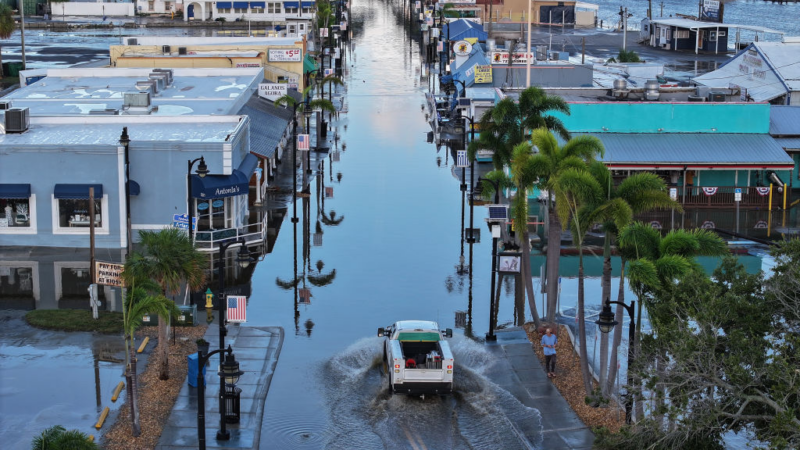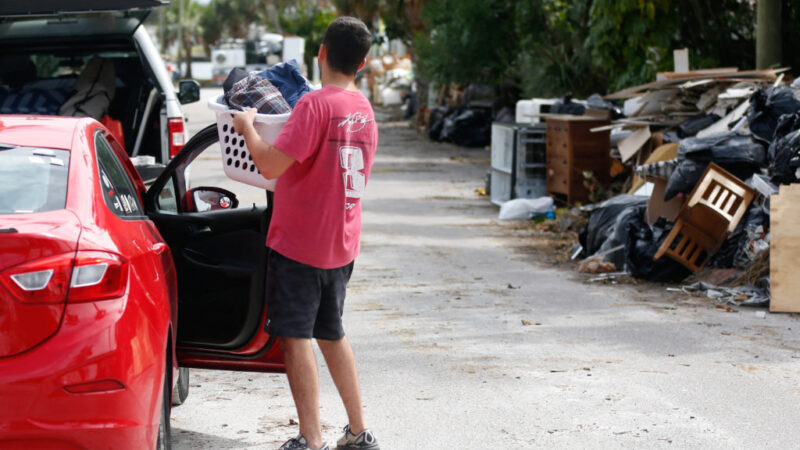Climate change made Helene more dangerous. It also makes similar storms more likely
Climate change made Hurricane Helene more powerful, rainier, and significantly more likely. And as temperatures continue to warm, the U.S. can expect more storms like Helene in the future.
Those are the findings of a study released Wednesday by researchers with World Weather Attribution, an international network of scientists who conduct rapid studies to assess the impact of climate change on major weather events.
The study found that rainfall from Helene was about 10% heavier due to human-caused climate change. That’s a massive amount of additional precipitation, and similar to other damaging, climate-fueled hurricanes in the past decade, like Hurricanes Harvey and Ian.
Climate change also made such heavy rainfall up to 70% more likely in central and southern Appalachia, where catastrophic flooding washed away roads, destroyed homes and businesses, and left thousands of people still without power two weeks later. So far, 230 people have died from the storm, though the true human toll will take years to fully determine.
“We found that essentially all aspects of this event [were] amplified by climate change to different degrees,” says Ben Clarke, an extreme weather researcher at Imperial College, London, and an author of the study. “We’ll see more of the same as the world continues to warm.”
Many of those same conditions are now fueling Hurricane Milton, which is currently headed toward Florida as a major, life-threatening storm.
Warmer ocean temperatures drive more powerful storms
A key factor in Helene’s intensity was extraordinarily high water temperatures in the Gulf of Mexico. Sea surface temperatures reached about 85 degrees Fahrenheit as Helene was forming.
Such temperatures were 200 to 500 times more likely because of climate change, the study found.
Loading…
Warmer ocean temperatures are perhaps the most important driver of more powerful storms, says Michael Wehner, a climate scientist at the Lawrence Berkeley National Laboratory who was not involved in the WWA study.
“It’s all about sea surface temperatures, at the end of the day,” Wehner says.
Wehner worked with a team on a similar analysis to fingerprint the impact of climate change on the storm, using different statistical techniques. His team found that climate change could have boosted Helene’s rainfall by up to 50% along parts of its pathway.
When ocean waters are hotter, storms can suck up additional moisture. That drives heavier rainfall – but it also acts as a power source for the storm: when water turns from vapor to liquid, it releases energy.
That, in turn, drives even more rainfall and potentially allows a storm to travel further inland.
“Simply put, the storm is more violent,” Wehner says.

Hurricane Helene eventually unleashed more than two feet of rain on some towns in North Carolina. Such an event would have been very unlikely without the 1.3 degrees Celsius (1.8 degrees Fahrenheit) of warming from human-caused climate change, the WWA analysis found.
Communities need to prepare for more intense storms
As warming continues, storms like Helene will become more common, the WWA analysis found.
Communities need to prepare for more intense storms in the future – even communities well outside historical hurricane zones, says Julie Arrighi, an author of the study and director of programs at the Red Cross Red Crescent Climate Centre.
“We need to really be adapting and preparing for these unprecedented, very extreme events,” Arrighi says.
Ultimately, the only way to head off more storms like Helene is to limit global warming, says Bernadette Woods Placky, chief meteorologist for Climate Central, who worked on the WWA analysis.
“We know what’s causing these increases,” Woods Placky says. “And we know if we don’t accelerate climate action, storms are only going to get stronger, wetter, and more frequent.”
Two Palestinian writers on the right to share their stories
In the year since the devastating Oct. 7 attacks on Israel, tens of thousands of Palestinians have been killed. Even more have been injured or displaced. Still, many Palestinians across the diaspora feel that they aren't allowed to share their stories — that the fullness of their humanity is too often reduced to a few soundbites on the news, or images of people dying. So on this episode, we're revisiting conversations with Fady Joudah and Tariq Luthun — two Palestinian American poets who have tried to carve out space to expand the kind of stories that Palestinians are allowed to tell.
Justice Department calls for sanctions against Google in landmark antitrust case
After a federal judge ruled in August that Google is illegally monopolizing the search engine market, the Department of Justice is now saying the company must be reined in.
Biden sets 10-year deadline for U.S. cities to replace lead pipes nationwide
President Biden on Tuesday set a 10-year deadline for cities across the nation to replace their lead pipes, finalizing an approach aimed at ensuring that drinking water is safe for all Americans.
The FBI arrested an Afghan man who officials say was planning an Election Day attack
The Justice Department said the man was inspired by the Islamic State militant organization and was plotting an Election Day attack targeting large crowds in the U.S.
GPB evening headlines for October 8, 2024
The head of the Georgia Emergency Management Agency is advising Florida hurricane evacuees to avoid areas hit by Helene. The head of the Federal Emergency Management Agency is speaking out against misinformation about the agency's response. The emotional toll from Helene is weighing on many. The state has set up resources in Valdosta to address mental health needs.
Luis Tiant, charismatic Cuban who pitched the Red Sox to the brink of a title, dies at 83
The charismatic Cuban with a horseshoe mustache and mesmerizing windup pitched the Red Sox to the brink of a World Series championship and pitched himself to the doorstep of the Hall of Fame.







